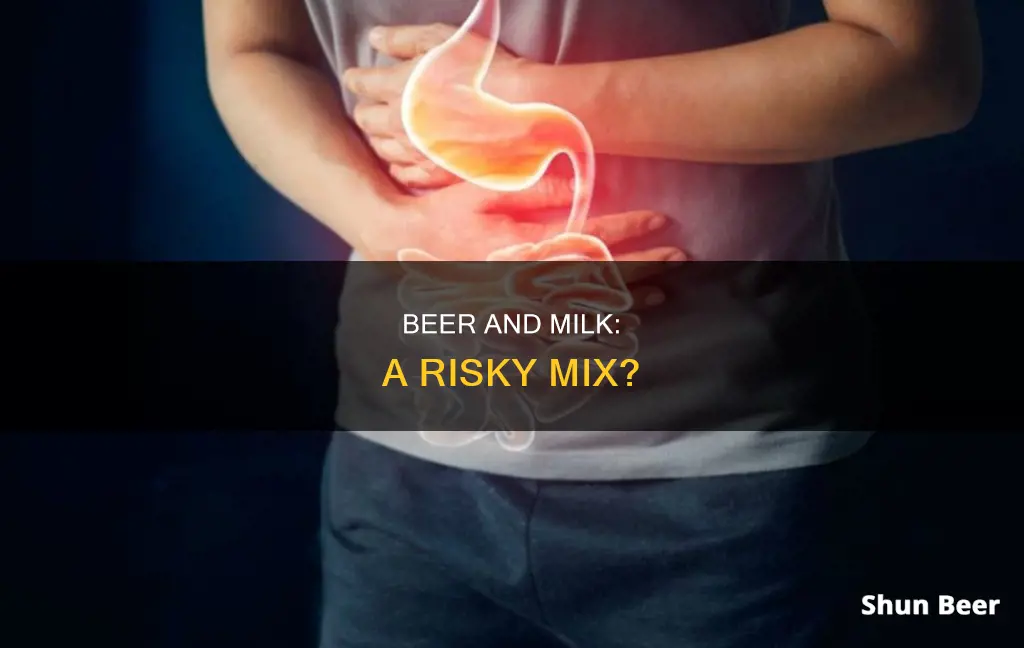
There are many old wives' tales about how to drink alcohol without experiencing negative side effects. One of these is the idea that drinking milk before consuming beer will line your stomach and prevent drunkenness. While this isn't true, drinking milk or eating before drinking alcohol may slow the absorption of alcohol into the bloodstream. However, it's important to note that drinking milk after beer may be worse than drinking it beforehand, as alcohol can disrupt the digestive process, and milk may worsen any resulting diarrhea.
| Characteristics | Values |
|---|---|
| Effectiveness of drinking milk before beer | Drinking milk before beer does not prevent drunkenness. However, it can slow down the absorption of alcohol into the bloodstream. |
| Effectiveness of drinking milk with beer | Beer can make milk curdle in the stomach, but milk will curdle in the stomach anyway due to the presence of stomach acid. |
| Effectiveness of drinking milk after beer | Drinking milk after beer can cause digestive issues, stomach pain, and constipation. |
What You'll Learn

Drinking milk before beer may slow down alcohol absorption
Drinking milk is believed to help "line the stomach" and slow down alcohol absorption before a night of drinking. While there is no scientific evidence that milk coats the stomach, drinking milk or eating foods containing fat, protein, or carbohydrates before drinking alcohol can modestly slow its absorption. This is because approximately 20% of alcohol is absorbed in the stomach, and the rest in the intestine. Therefore, consuming milk or food before drinking can delay stomach emptying, giving the body more time to absorb alcohol in the intestine.
The belief that milk coats the stomach and prevents drunkenness is a myth. Alcohol absorption primarily occurs in the small intestine, which has a larger surface area than the stomach. Additionally, the pyloric sphincter separates the stomach and small intestine, closing when food is ingested to allow the stomach to break it down before passing it to the small intestine. As a result, even if alcohol and milk are consumed simultaneously, the alcohol will eventually reach the small intestine, where most of it is absorbed.
However, drinking milk or eating before drinking alcohol can still have a modest impact on slowing alcohol absorption. This is because the pyloric sphincter remains closed when food is ingested, causing alcohol to reach the small intestine at a slower rate. While this doesn't prevent intoxication, it can help manage alcohol consumption and its effects.
To effectively slow alcohol absorption, it is recommended to space alcohol intake by drinking non-alcoholic beverages, such as milk, between alcoholic drinks. Consuming protein-rich foods, such as meat, cheese, or nuts, before and during drinking can also help. These strategies can help slow the rate of alcohol absorption, giving the liver more time to metabolize it. However, it's important to remember that the body will still absorb all the alcohol eventually.
In conclusion, while drinking milk before consuming beer may not completely prevent intoxication, it can help slow down alcohol absorption. This is due to the delay in stomach emptying, allowing more time for alcohol to be absorbed in the intestine. Combining this strategy with other responsible drinking practices, such as spacing drinks and consuming protein-rich foods, can further help manage alcohol consumption and its effects on the body.
Minneapolis Park Beer Rules: What You Need to Know
You may want to see also

Beer and milk can be combined in a cocktail
While drinking milk before alcohol will not prevent you from getting drunk, it can slow down the absorption of alcohol into the bloodstream. This is because food in the stomach delays the emptying of the stomach, and around 20% of alcohol is absorbed in the stomach.
If you're looking to combine beer and milk in a cocktail, you could try an Irish Slammer, which tastes like a chocolate milkshake. To make this, pour 6 fluid ounces of Irish stout beer into a pint glass. Then, pour 3/4 fluid ounce of Irish whiskey and 3/4 fluid ounce of Irish cream liqueur into a shot glass. Drop the shot glass into the pint glass and drink the entire contents at once.
Another beer, wine, and milk cocktail option involves pouring 150ml of old red wine and 50ml of whole milk into a shaker filled with ice. Shake vigorously for 10 seconds, then pour the mixture into a large glass. Top it off with five 250ml bottles of your preferred beer and stir gently. Garnish with a slice of orange or a sprig of fresh mint.
Some people also enjoy mixing beer and milk before bed, comparing the taste to a root beer float.
A Beginner's Guide to Enjoying a Beer Flight
You may want to see also

Beer and milk can be mixed in a milkshake
The key to successfully mixing beer and milk in a milkshake is to use the right types and proportions of each ingredient. Firstly, the type of milk matters. Milk with a higher fat content, such as whole milk or cream, is less likely to curdle when mixed with beer. This is because the fats in the milk protect the milk proteins from the acidic effects of the beer. On the other hand, low-fat or non-fat milk is more likely to curdle when mixed with beer due to the lack of protective fats.
The choice of beer also plays a role. Fresh beer is generally recommended, as older beer may be less acidic and therefore less effective at curdling the milk. Additionally, the specific flavours and characteristics of different beers can greatly influence the taste of the milkshake. For example, a stout or a dark beer might pair well with a chocolate or vanilla milkshake, while a lighter beer might be better suited for a fruity or citrus-flavoured milkshake.
When mixing beer and milk in a milkshake, it's important to use the right proportions. A general guideline is to use more beer than milk, with some suggesting a ratio of 80% beer to 20% milk. However, this may vary depending on personal preference and the specific ingredients used. It's also worth noting that drinking too much of this mixture may not be advisable, as excessive consumption of alcohol and milk can lead to digestive discomfort.
While the idea of mixing beer and milk in a milkshake may seem unusual, it can be a tasty treat for those who enjoy experimenting with unique flavour combinations. However, it's important to be cautious and aware of the potential risks of consuming alcohol and dairy together, such as the possibility of curdling and digestive issues.
Beer and Zyrtec: Safe Mix or Health Risk?
You may want to see also

Beer can make milk curdle
It is a common belief that drinking milk before consuming alcohol can help to lessen the effects of alcohol by "lining your stomach". However, biologically speaking, there is no evidence to support this claim. While drinking milk before alcohol will not "coat your stomach" and prevent you from getting drunk, eating before or while drinking alcohol can help to slow down the absorption of alcohol into the bloodstream. This is because the pyloric sphincter, which separates the stomach and small intestine, closes when food is ingested, causing alcohol to reach the small intestine at a slower rate.
Although drinking milk before alcohol will not prevent intoxication, it can help to slow down the absorption of alcohol. Around 20% of alcohol is absorbed in the stomach, while the rest is absorbed in the intestine. Therefore, consuming milk or other foods containing fat, protein, or carbohydrates before drinking alcohol can help to delay stomach emptying and slow down the absorption of alcohol.
It is worth noting that the effectiveness of drinking milk before consuming alcohol may depend on the type of alcohol. Beer, for example, is naturally acidic with a pH level ranging from 4.1 to 4.6. This acidity can cause milk to curdle, as it neutralizes the negative charge on casein micelles, causing them to clump together and form lumps. The higher the fat content in the milk, the less likely it is to curdle, as fat coats the casein molecules and provides some protection against curdling.
To avoid potential curdling, it is recommended to use fresh ingredients and introduce them slowly at cool temperatures. Additionally, opting for milk with a higher fat content, such as heavy cream, may reduce the likelihood of curdling. However, it is important to note that consuming milk before drinking beer may not completely prevent curdling due to the acidic nature of beer.
In conclusion, while drinking milk before consuming beer may not provide a protective "coating" for your stomach, it can help to slow down the absorption of alcohol. Additionally, the acidity of beer can cause milk to curdle, but this can be mitigated to some extent by using fresh ingredients, introducing them slowly at cool temperatures, and choosing milk with a higher fat content.
Warm Beer: Safe to Drink or Not?
You may want to see also

Drinking milk after beer may cause digestive issues
When alcohol and milk are consumed together or in close succession, the slowed digestive process caused by alcohol can delay milk's digestion. This might lead to increased fermentation of milk sugars, particularly in those with lactose intolerance, resulting in gas, bloating, and indigestion. The diuretic effect of alcohol can also lead to dehydration, which can further complicate the digestive process.
While there is no substantial evidence that consuming milk after beer leads to severe digestive problems for everyone, individual reactions can vary due to personal sensitivities such as lactose intolerance. Understanding your body's limits and ensuring you are not exacerbating any underlying health issues is crucial.
To mitigate potential digestive issues, it is recommended to wait at least two to three hours after drinking beer before consuming milk or dairy products. This allows the body to process the alcohol to some extent, potentially reducing the risk of discomfort. Staying hydrated and consuming food before drinking alcohol can also help to reduce the negative effects of alcohol on digestion.
Beer on Metra Trains: What's Allowed and What's Not
You may want to see also
Frequently asked questions
No, it is not a good idea. Beer can and will make milk curdle. It can happen in a variety of different situations. Drinking curdled milk can make you sick.
It is more likely that the beer is what's causing diarrhea. Alcohol disrupts the digestive process when it enters your intestines. Milk can make diarrhea worse, but unless you are lactose intolerant, it usually doesn't cause diarrhea.
Drinking milk after a couple of beers is worse than drinking milk before beer. That said, as long as it's just a glass, it shouldn't affect you any more than the beer will if you drink too much.
Yes, you can drink a glass of milk before beer with no unfortunate side effects. Drinking milk won't line your stomach to prevent throwing up, but eating beforehand will slow down the absorption rate of alcohol.
Some ways to slow down the rate of alcohol absorption include spacing out alcoholic drinks with non-alcoholic drinks, drinking protein-rich foods before and while drinking, and eating a meal before drinking.







